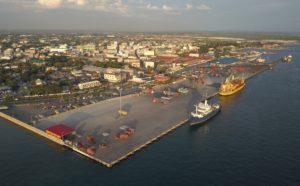 In order not to disrupt the international cargo supply chain, Philippine ports remain open to all ships even from those originating from China and its special administrative regions (SARs) amid the outbreak of the Novel Coronavirus Acute Respiratory Disease (nCoV ARD).
In order not to disrupt the international cargo supply chain, Philippine ports remain open to all ships even from those originating from China and its special administrative regions (SARs) amid the outbreak of the Novel Coronavirus Acute Respiratory Disease (nCoV ARD).
The Philippine Ports Authority (PPA), in a statement, said the only condition is the non-disembarkation of vessel crew and no visitors allowed while docked in any PPA-controlled port or at anchorage.
PPA general manager Atty. Jay Daniel Santiago noted that majority of Philippine cargoes originate from hub ports located primarily in China and its SARs like Hong Kong and Taiwan as Philippine ports are predominantly considered as feeder ports.
“We cannot afford to ban the entry of international ships to our shores in the midst of this nCoV ARD scare as doing so will surely paralyze our supply chain as most of our imports and exports go to the hub ports located in China and its SARs,” Santiago stressed.
“Instead, we are banning the disembarkation of the crew of any vessel which called in China or any of its SARs within the 14-day period prior to its arrival in any Philippine port,” Santiago said, adding that no visitors are also allowed within such period in order to minimize person-to-person interaction with the crew.
“We also noted that vessel operators also change crew at some point in the voyage of the vessel, and if such case happens in the Philippines, the crew who will be replaced shall undergo strict quarantine period and only be allowed to go home if cleared by the Department of Health,” Santiago added.
Santiago, however, reiterated that ships calling in the Philippines more than 14 days after calling out at a port in China or its SARs shall be allowed to dock without restrictions.
To ensure that this new measure is implemented, a special team will be deployed to monitor the movements of personnel and people inside the port. PPA said it is also coordinating closely with the Office for Transportation Security and the Maritime Industry Authority, as well as agents of ships calling in the Philippines, to issue parallel directives within their jurisdiction.
PPA said these measures are to prevent further contamination of nCoV ARD, a virus that was first detected in Wuhan, Hubei, China.
The World Health Organization has declared nCoV ARD—which has claimed more than 300 deaths and infected thousands—as a public health emergency of international concern. The Philippines declared its first positive case on January 30, and the death of another patient on February 2.
“Shipping operators need not worry as long as you follow this condition and those listed in the guidelines of the Bureau of Quarantine relative to concerns with a declaration of public health emergency with international concern, you can call at any Philippine port,” Santiago said.
Last January 31, PPA adopted stringent prevention measures in PPA-controlled ports, which include, among others, general thermal scanning, as well as individual scanning to check if a passenger’s body temperature has reached a certain level.
READ: PPA needs more scanners as stricter measures employed across PH ports
As early as the first report of an outbreak in China involving the nCoV, the agency has immediately put in place frontline defense against the possible entry of the virus in the country via the ports, PPA said.
PPA added that it is also in close coordination with Customs, Immigration, Quarantine and Security vessel boarding teams so that essential information that may need swift action could be provided to the ground personnel.
The agency has likewise started to establish dedicated nCoV Malasakit HelpDesk to facilitate the processing of reports on possible victims. Face masks and sanitizers have also been distributed to frontline employees.
“We recognize the dilemma of our seafarers and the difficulty that they face while at sea, but we also have to guarantee the safety of those offshore. Rest assured that everything will be reinstated when this nCoV ARD scare is over,” Santiago said.
Photo from PPA





